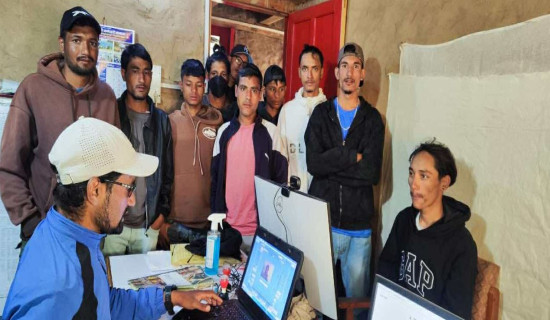- Sunday, 16 November 2025
Kame tool aids numerous handless Nepalis
By Raman Paudel,Kathmandu, Nov. 16: Madan Kumar Bohora, hailing from Damak, Jhapa, is a person with a disability in one hand and also a rights activist. A few days ago, he posted photos of himself chopping vegetables, cutting grass, and carrying things with an artificial hand.
“How harsh our society and world are? As soon as there is a limitation in the function of any part of the body, a disabled citizen has to repeatedly prove to the general public that they can work alongside them,” he wrote in the caption for his photos.
Like Bohora, at least 199 persons with disabilities from various districts across Koshi Province received artificial hands in Itahari this week.
Many of them expressed their excitement after receiving artificial hands, saying they can now work more easily, similar to ordinary people.
After receiving their artificial hands, many tried to use them, and some appeared enthusiastic. Ultimately, they are all thankful to their new support system.
“Seeing the enthusiasm of the beneficiaries and the happiness of these poor citizens brought tears to my eyes,” added Bohora, a beneficiary himself.
A nine-day workshop on artificial hand measurement, installation, and distribution was held in Itahari, Sunsari. It was organized by the Karuna Foundation with financial support from the Koshi Province Government and the local levels, as well as technical support from the Germany-based Hands Project.
According to Deepak Sapkota, Executive Director of the Karuna Foundation, at least 199 individuals received 204 artificial hands. “We have been working in all 12 disability categories, supporting people in their daily needs. This time, many beneficiaries showed their excitement and enthusiasm while receiving the artificial hands,” stated Sapkota.
According to the Karuna Foundation, three types of artificial hands were distributed during the programme. One of them was Kame tool, which is considered more modern and easier to use.
Additionally, this type of artificial hand was distributed on a mass scale for the first time in Nepal during the Itahari programme.
Chris Gulley, Director of the Hands Project in Germany, also took part in the programme focused on installing artificial hands and training beneficiaries in Itahari.
Technician Isaac Makula and trainer Kamanzi Blessle also joined the team led by Gulley.
Speaking to The Rising Nepal, Gulley said that this type of modern artificial hand is easier and more practical than others.
“When I visited Nepal previously in 2022, I saw people with disabilities using artificial hands that were much heavier and not easily movable. However, the Kame tool has been considered very easy to use by many African countries. It looks similar to a natural hand and is comfortable and easier to use,” said Gulley.
For about a decade, Gulley has distributed tens of thousands of hands through the Hands Project in various African countries. The deep social stigma that people with disabilities continue to face is something Gulley finds quite troubling.
In Nepal, Gulley distributed hundreds of artificial hands for the first time in 2022, and he has been distributing artificial hands across the world every year. He said he was touched by the social stigma faced by the disabled community in Nepal.
Gulley has set a new plan for next year: to trek along a mountain range while installing artificial hands during his journey.














